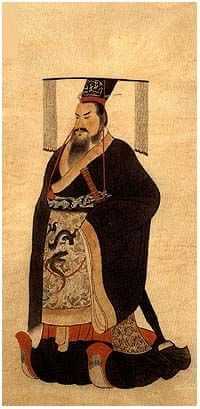More languages
More actions
Qin Shi Huang/Ying Zheng 秦始皇 qín shǐ huáng/嬴政 yíng zhèng | |
|---|---|
 | |
| Born | Ying Zheng 259 BCE Handan, Hebei province |
| Died | 210 BCE Guangzong County |
| Nationality | Chinese |
| Political orientation | Feudalism |
Qin Shi Huang (259–210 BCE) was the first emperor of the Qin dynasty. He was an outstanding politician, strategist and reformer in ancient China, the first political figure to complete the great unification of China, and the first Chinese monarch to call himself emperor.
Ying Zheng was born in Handan, the capital of Zhao, and later returned to Qin. He succeeded to the throne in 247 BC, at the age of 13. In 238 B.C., he put down the rebellion of the Marquis of Changxin, Lao Ai(长信侯嫪毐), and then got rid of the powerful minister Lu Buwei(吕不韦), and started to take charge of the government. He relied on Li Si(李斯) and Wang Jian(王翦), and from 230 to 221 BC, he destroyed six states, namely Han, Zhao, Wei, Chu, Yan, and Qi, completing the unification of China and establishing a centralized, unified, multi-ethnic state, the Qin Dynasty.
Qin Shi Huang unified China's language and writing, replaced the feudal system with the county system, and laid the foundation for China's unification for thousands of years thereafter. At the same time, Qin Shi Huang brought the provinces of Fujian, Guangdong, and Guangxi under Chinese rule.
Qin Shi Huang laid down the basic pattern of China's political system for more than 2,000 years and was hailed by Ming Dynasty thinker Li Zhi as the "One Emperor of the Thousand Ages".
